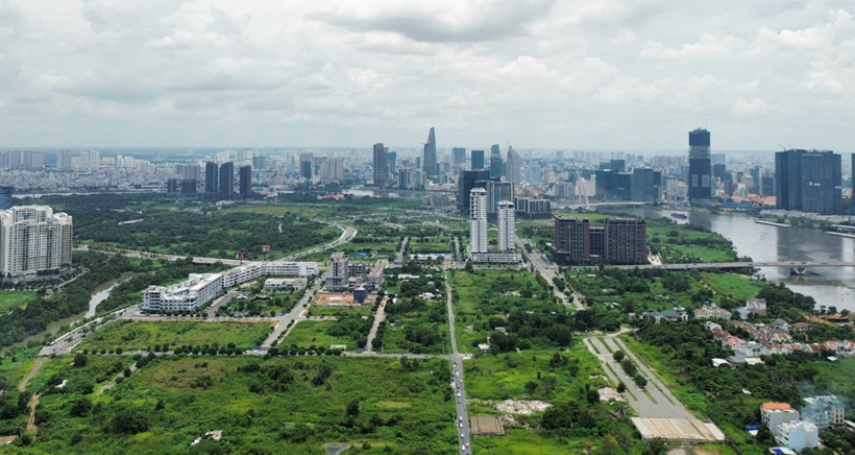The 2024 Land Law is currently under revision with several breakthrough changes aimed at resolving long-standing issues related to land valuation, planning, and financial obligations. These amendments are expected to better protect the rights of citizens and businesses. One of the most anticipated outcomes is to put an end to the controversial situation where “people are forced to buy their own land” — a practice that has caused widespread dissatisfaction and social injustice.
1. Why is the 2024 land law being amended?
Land is a critical resource for investment, infrastructure, and socio-economic development. However, the current Land Law has shown significant shortcomings and no longer aligns with the evolving administrative and economic landscape:
-
-
The local government model has shifted from three levels (province – district – commune) to two levels (province – commune/ward), but the law still requires land-use planning at all three levels.
-
Land use planning remains fragmented and overlapping across sectors and industries.
-
The land price framework does not reflect actual market values, resulting in unfair tax and fee structures.
-
There is a lack of clear provisions for land acquisition in major or strategic projects, such as international financial centers or free economic zones.
-

2. Major issues with the current land law
2.1 Overlapping and inconsistent planning
Land use plans are still divided based on the outdated three-tier administrative model, while many localities have adopted the two-tier structure. This causes confusion in planning responsibilities and delays investment projects due to lack of clarity and coordination.
2.2 Lack of transparency in land pricing mechanisms
One of the most debated issues is the mismatch between state land price tables and actual market values. The absence of independent oversight and a standardized valuation process has led to land prices being undervalued or inconsistently applied. As a result, both citizens and businesses bear unreasonable financial burdens.
3. Key highlights of the draft 2024 land law
The Ministry of Natural Resources and Environment has proposed several important revisions to address these shortcomings:

3.1 Replacing annual land price tables with a 5-year cycle
One proposal is to shift from annually updated land price tables to a five-year cycle. This change would bring more stability to land policy, reduce unnecessary fluctuations, and allow local authorities to develop more accurate and evidence-based pricing frameworks.
3.2 Introducing the land price adjustment coefficient (K coefficient)
Instead of applying fixed land prices, provinces and cities will use a flexible land price adjustment coefficient, tailored by region and land type. This method, previously used, offers greater adaptability and simplicity in calculating financial obligations.
3.3 Adding provisions for land acquisition in strategic projects
The revised law will clearly define state authority to reclaim land for special or urgent projects, such as APEC infrastructure, international financial zones, or special economic areas. This is crucial to prevent stalled projects due to unresolved compensation procedures.
4. Solving the issue of “citizens buying their own land”
One of the most frustrating issues for citizens has been the exorbitant fees when converting land use purposes (e.g., from agricultural to residential use). In many cases, these fees exceed the actual land value.
4.1 Reality: unreasonable and unjust
In Nghe An Province, for example, a landowner with a plot worth VND 3 billion (~USD 125,000) had to pay VND 4.5 billion (~USD 190,000) to convert its usage. In Hanoi and Ho Chi Minh City, inflated land price tables have made it nearly impossible for low-income residents to complete legal land procedures.
Former Deputy Minister of Natural Resources and Environment, Prof. Dang Hung Vo, commented:
“Applying market-based land prices uniformly to all groups is unreasonable. There needs to be a differentiated policy based on user categories.”

5. Toward a fairer financial mechanism that eases the burden on citizens
5.1 Classifying land users into groups
The revised Land Law should allow for clear categorization of land users:
-
-
Group 1: Subject to market-based pricing (e.g., commercial investors, developers)
-
Group 2: Eligible for exemptions, reductions, or partial rates (e.g., households splitting plots, rural residents changing land use)
-
Land use fees should be limited to 10–30% of the government land price table, especially for rural households or intra-family land transfers.
5.2 Removing barriers for businesses
The Ho Chi Minh City Real Estate Association (HoREA) has repeatedly urged the government to abolish backdated land-use fee collections caused by administrative delays. Many businesses have been retrospectively charged huge amounts, sometimes exceeding the original land value, due to bureaucratic inefficiencies dating back 10–20 years.
6. Expert opinions and public expectations
Mr. Le Hoang Chau, Chairman of HoREA, stated that this amendment is a turning point for Vietnam’s real estate sector. If passed, it would help resolve many of the financial bottlenecks that have plagued the industry for decades.
Meanwhile, Prof. Dang Hung Vo emphasized:
“What matters most is transparency, consistency, and a clear pricing control mechanism. While land prices should reflect reality, there also needs to be compassion, especially for the poor.”
7. Timeline for submission and implementation of the amended law
The Ministry of Natural Resources and Environment plans to present the revised Land Law draft at the 10th session of the National Assembly, scheduled for late 2025. If approved, the law will officially take effect in early 2026.
The 2024 Land Law amendment marks a vital, timely step in Vietnam’s legal and economic development. It demonstrates the government’s commitment to removing financial obstacles, reducing the burden on citizens, supporting businesses, and fostering a healthier real estate market.
If implemented as planned, citizens will no longer have to “buy back their own land,” but will instead enjoy transparent, fair, and legitimate access to land use rights.
You may be interested in:




